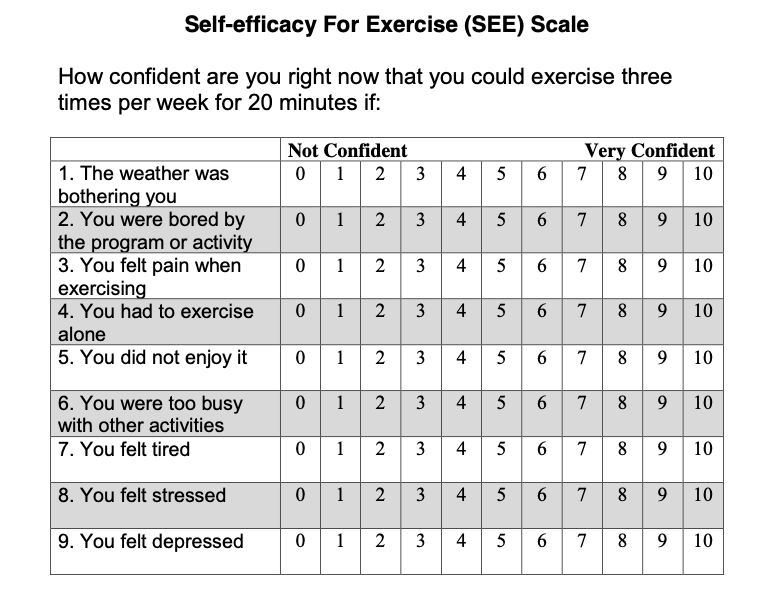
Why Self-Efficacy Matters & How to Build It
By Annika Piros PT, DPT | Therapydia Tanasbourne
Has the weather or your mood ever stopped you from achieving a goal? Is the coronavirus pandemic affecting your motivation to carry-on with usual routines? (the ones that are within your control.) Having control over our behaviors, motivations, social environments is a theory that psychologists, educators, and clinicians refer to as self-efficacy. In the words of psychologist Albert Bandura: self-efficacy is an “individual’s belief in his or her capacity to execute behaviors necessary to produce specific performance attainments”. It is a concept used to promote behavior change in the self-management of i.e. chronic disease, exercise, pain control, eating, smoking cessation, and alcohol use.
One way to measure self-efficacy of a habit – like exercise – is through answering a questionnaire. The Self-Efficacy for Exercise scale (SEE) is a self-reported scale that helps one gauge how they are feeling about their exercise habits. It is scored from 0-90 points where a low score indicates low self-efficacy and a high score indicates high self-efficacy. Higher self-efficacy predicts both better physical activity, health, and quality of life (Roman et al. 2009); it allows one to carry on with the habit of exercise despite encountering obstacles (ie. being busy, stress, an injury, or bad weather).

Physical Therapists use the SEE scale listed above, along with their clinical judgement, to determine how self-efficacy will affect a patient’s outcomes in therapy. If a patient scores low on self-efficacy, this may signal to the therapist that prescribing home exercises alone will be insufficient in helping a patient achieve their goals. A physical therapist educated patients on how to build up self-efficacy for long term success and well-being after an injury. Three general strategies are listed below:
1. Goal-Setting
A PT will help you set realistic goals and a plan to achieve them. Approaching goals slowly and trying not to over-stress about the results can help build self-efficacy
2. Identifying and Reframing Obstacles
Pain can be viewed as an obstacle to exercise when injured; your PT will help you identify what is normal vs abnormal pain to work through as well as how to modify activities to continue exercising!
3. Choosing Activities We Enjoy
This sounds obvious, but choosing an activity you like for exercise makes it that much easier to stick with the habit!
Building self-efficacy helps a person gain control over their behaviors in order to adopt healthy habits and stick with them, despite challenges or obstacles they may face. Learning how to manage an injury and be less reliant on others is a sign of high self-efficacy. A physical therapist will teach you how to “be your own PT” by the end of a course of rehab; you will learn how to identify obstacles that are keeping you from reaching your wellness goals. In addition to helping you recover from an injury, physical therapists are equipped to teach patients strategies to make exercise a habit even when pain, injury, or obstacles get in the way. Have questions? Reach out to your local PT today to see how you can improve your self-efficacy with exercise!
Sources
- https://www.apa.org/pi/aids/resources/education/self-efficacy
- https://positivepsychology.com/3-ways-build-self-efficacy/
- https://www.sralab.org/sites/default/files/2017-06/Self-efficacy%20for%20exercise_Website_PDF.pdf